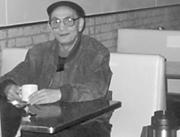THE WHISKEY is where it should be, next to the front door when you walk in. Then come rows of tables piled with Italian food. After that, rows of Italians. The first person to walk up says, “Hello, I’m Nick’s ex-wife. What can I get you?”
A double bourbon, this being a wake and all. Nicholas Joseph Finamore’s memorial bash was on Logan Avenue in Renton. At the age of 66, Nick died of cancer. Through the sunshine and into the rented Musician’s Hall, a crowd came to tell stories, like they did at Nick’s hole-in-the-wall at 604 Pike, the Abruzzi Pizza House. That’s where Nick stood in the window and tossed dough for 38 years.
Only days earlier, Seattle was crying into its Chianti over Nick’s old competitor, Vito, who was 79 when he died. Vito Santoro ran a nice joint up on Madison for 40 years, a bettah version of today’s Little City Halls. At the tables was everyone from politicians on up to pimps. Lost your liquor license? Thinking of a future in civil service? Cops’ bagman getting greedy? Go to Vito’s big eating room next to the bar, buy a round for the mayor’s table. Done. Fini!
The old Italian places were like this. At one time downtown, the four corners of Italia were Vito’s on the east, Victor Rosellini’s 410 on upper Fourth Avenue, the Gasparetti brothers’ house on lower Fourth, and Pizza Nick’s on Pike. Friend and customer of them all, Tommy Ryan thinks they represent 150 years of Seattle spaghetti-tossing and pizza-flipping. He looks fondly upon their legacy, a river of marinara rivaling the Duwamish.
They’re not all dead. But “The good ones,” someone says at the table, “they pasta on too soon.” The redevelopment plague called NikeTown killed Abruzzi Pizza.
At first Nick would tell friends “There’s some kinda tennis shoe store goin’ in here.” That was after a real estate attorney sent him a letter stating the building was coming down, go somewhere. Who cares about four decades? People started coming in and asking for Pizza Nike. Nick would try to laugh, but it hurt. “I made a mistake,” he told me. “I became a success.”
Nick took over from father Angelo, who brought the family from Chicago and with $1,200 began Abruzzi Pizza in 1956. Nick’s family also ran a place in Renton, and brother Joe still has Guiseppe’s in Bellevue. When torn down in 1994, Abruzzi Pizza—named for the Italian region of Nick’s dad—still had its original air conditioner, refrigeration, and, for the most part, its d飯r: fake brick walls and Nick, the real deal. At the tables had sat a legendary mix of prostitutes and pols, prizefighters and priests, cops and comedians. Recently in the Times, hometown comic John Keister was lamenting the sterile new Seattle, noting, “When GameWorks and NikeTown came in, that building got knocked down, and we lost Abruzzi Pizza. That was a damn shame.”
Just one of them. Across from Nick’s was a bowling alley above a cigar store called the Carcinogen, both were run by a black pornographer named Slim who once got arrested by telephone. Around the corner was the Nikko Garden go-go joint where if you complained a barmaid swatted you with a stick. The Club Chi Chi, all crappy and wonderful, was up Pike near the Flick, the street’s last porn theater. The day the Flick closed, its sole employee called me up: “After the last film ended at 6:30 this morning,” he said, “I went down and woke up the last three customers. The workmen are starting to take out anything of value right now. They should be done in a coupla minutes.”
Once, at Sixth and Pike, I saw a man run past with a pull-tab machine. I didn’t ask.
At the table on Logan, someone says, “Do you remember Bob’s Chili Parlor?” Everyone nods. That was a rough bar a block over on Union, now improved into the Sheraton Hotel parking lot. “Remember Russian Nick? Bob knocked him over a table. Nick was on the floor. He takes out a gun. Shoots Bob in the brain. Self-defense!”
All afternoon the sentences began “Remember. . . .” It was about a time long gone, and maybe meaningless. But the man who stood at his door all those years in a white apron, extending a white-floured hand, had a knack for making the old seem new again. “If these walls could talk,” Pizza Nick said one fine day, “it would be a miracle!” I didn’t ask.








